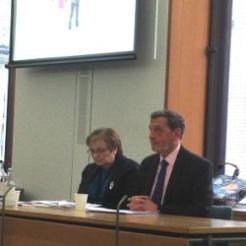Charity ‘cartels’ who have dominated school fundraising in the past are pulling out as a result of the success of a giving initiative which encourages children to choose which charities they support, the CEO of the charity responsible has said.
Andy Thornton, chief executive of the Citizenship Foundation which runs the Giving Nation initiative, told an audience of peers at the Growing up Giving Parliamentary inquiry yesterday that the programme was resisted by the charity sector when it launched four years ago because a ‘cartel’ of larger charities had invested a lot in attracting potential donors to their own charities over a number of years.
“If you’ve done something in school for something you believe in you’ve learnt the mechanisms of supporting a charity you believe in. You’re then more likely to go on to adopt it in a later life, so that method is good. But that method was quite resisted by the voluntary sector when we started it, in fact they didn’t like it at all and I got flack for it when we started Giving Nation.
“Because, the bigger charities had been investing for many years - the NSPCCs, the British Red Cross, the Oxfams - they were the few people that put time into supporting school work. When we came along we said, well, what we’d like is young people to choose what charities they support. We kind of bust the cartel, because the few charities that put time into schools were getting a return on their investment in fundraising terms by putting staff into schools, nurturing teachers,” said Thornton.
Thornton said that the latest figures show that Giving Nation, which has seen over 190,000 young people run their own social action projects, has increased the number of charities supported through the student population ten-fold and doubled the value of donations to the sector.
While there has been a “sea-change” at policy level in implementing such student-led activity, Thornton said that the success of Giving Nation has led to larger charities pulling out of schools, believing that they now felt it was “not worth their time”.
David Blunkett, who is chair of the inquiry, called for further discussion on how to combat this withdrawal in future sessions.
The 12-month Growing up Giving inquiry was launched by the Charities Aid Foundation based on its report published last month which found that over 60 per cent of young people said they would be encouraged to help charities if activities were arranged by their schools. This result trumped more “juicy” options like celebrity incentives, according to Richard Harrison, director of research at CAF. Some 99 per cent of young people said they felt they heard a lot about charities, with schools being the most popular response to where they heard about them, at around 50 per cent.








